All you need to know about Morocco
Where to stay?

Morocco has accommodation built to suit all kinds of travellers and budgets. In most cities, you will find hotels built specifically to accommodate western tourists who are accustomed to certain amenities’ such as air conditioning, hot/cold water on demand and High-speed Wi-Fi. These hotels also come with a range of in-house facilities such as swimming pools, bars, restaurants, gyms and play areas for children. In recent years many locals have renovated town properties called riads, which are rooms located around a central courtyard with a roof terrace. If you’re looking to escape from city life, Moroccan has many beautifully designed small boutique hotels, renovated Kasbah’s and Berber family-run hotels. You also have the option to stay in an all-inclusive villa, if you are a large group. Here your food/laundry can be provided for at a reasonable price. For those outdoor lovers who feel more comfortable sleeping out under the stars, there are basic deep camps and even luxury tents with private en-suite facilities and hot water.
What is the culture like?

Morocco has some of the most diverse and deep cultural heritage which reflects eras such as the Carthaginians, Romans, French, Spanish and Arabs. The Berber tribe make up the largest demographic, which is complemented by the diaspora of Arabs, Jews, Muslim, Africans and Europeans over the decades.
The late King of Morocco, Hassan II often compared the country to a tree that had spread its roots deep and far into the heart of Africa, its trunk solid and stable in the Arab Islamic empire and its branches reining far and beyond to countries at the heart of Europe like Spain, Portugal and France.
Morocco is becoming one of the most socially developed countries in all of Africa, with technological advances that its neighbouring countries are yet to explore. Despite this influence of modern implementation, its rich and diverse culture remains unchanged and anchored in the communities and family values that are practised and cherished by many Moroccans still to this day.
What’s the weather like?

Morocco’s climate is one that varies between region and area. Nonetheless, the hottest time of year in Morocco is midsummer at the heart of the Sahara, with a record-breaking 49 degrees Celsius ever recorded. In contrast along the coast and especially in the Atlas Mountains the weather is much cooler all year round, but like most countries, it would be hard to give an exact measurement.
Spring in Morocco comes around the end of April or the beginning of May, which is a perfect time to visit the Rose Valley on the Rose festival which is a beautiful display of pink and red. It also consists of a three day festival for feasting markets and chariot procession through a shower of rose petals -definitely a sight not to miss. Winter nights in the South are pleasant and airy, although the nights can be cold.
Published annual weather reports are available online in the cities of fez Marrakesh, with an average temperature of 21 Celsius but if you are used to a colder climate it would be advised to travel in the spring months as opposed to in the heat of summer so that you can enjoy what Morocco has to offer without being dismayed by the weather.
Worried about your Carbon Offset?
If you are environmentally friendly and would like to make your trip as carbon neutral as possible, please feel free to check out the websites below where you can donate to some of the world-leading climate and global warming efforts
www.climatecare.org
www.carbonneutral.com
www.atmosfair.com
No need for a Culture Shock!
Moroccan culture is much unlike any other country in the world because of its diverse and rich roots in a plethora of different identity’s, traditions and values.
One travelling from Europe may feel as if they have been transported back in time to a place of ancient wonder. But one thing for certain is that Morocco is full of contrasts and whatever you are looking for can be discovered. If you are seeking to be immersed in the hustle and bustle of city life Marrakesh and the square of Djemaa El Fna is perfect for shopping, tasting new flavours, admiring the architecture and speaking with the locals. One could also find themselves sitting in the tranquillity of the Sahara desert atop a sign June just before sunset, a memory one could never forget.
When leaving the confines of your luxurious mosaic hotel, you will see things like children playing in the streets with homemade toys, vendors selling fruit and vegetables whilst calling out to the neighbourhood of their fresh produce, donkeys assisting workers with their load and women washing clothing in rivers, Morocco is full of rich cultural experiences that are waiting to be explored.
This country contrasts with the European style of living with traditional values at its heart, truly a place for contemplation or distraction, depending on where you look.
One of the biggest culture shocks for many tourists who visit Morocco is having to haggle to buy anything in the local souks. Haggling is very much a way of life and a necessary part of buying commodities in the country, whether it’s fruit or vegetables, trinkets or instruments, haggling is a staple piece of Moroccan social life.
What Currency do they use?
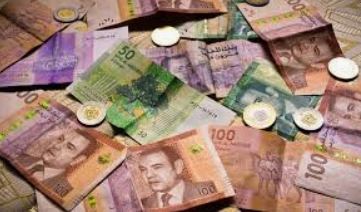
The official currency of Morocco is Moroccan Dirham (MAD) which cannot be exported or imported other than in small amounts, so you’ll have to exchange when you’re there at one of the many currency exchanges booths. Be sure to retain your transaction receipts as they are required when converting money back on your departure. There are many ATM’s all around the cities and town, which will allow you to withdraw MAD cash. It is advisable to keep some European notes in case of an emergency.
What should I wear?
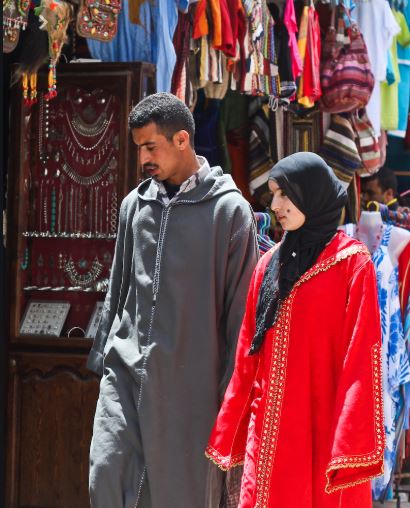
Islam is the official religion of the Kingdom of Morocco if you wish not to disrespect the locals dressing respectfully is advised. This means wearing a long and loose garment that is ideal for summer but also cover your body from knees to shoulders, whether it be t-shirts or shirts, skirts or trousers, they must cover the areas between your shoulders and your knees.
In the larger cities such as Marrakech, Fes or Agadir, Moroccans tourist dress as fashionably as they would in their hometowns, although this will be a stark contrast to the women who wear traditional garments called jellaba or Derra which is a long and cloak-like, that is sometimes accompanied by a hood.
It is advised to wear linen and cotton whenever possible during the hot summer months, although a cardigan or light jacket is advised during the night-time as it can get chilly. October is the wettest season in Morocco, although with global warming it has all become increasingly unpredictable.
Electrical supplies?
The standard voltage supply is 22v from most mains sockets, however, some older buildings and riads may have 110v so be sure to ask before plugging in any appliances. The sockets follow the European style of two-pronged, so be sure to bring an adapter if you are travelling from a country outside of Europe.
Essential Packing items?
Here is a list of must-have essential items to pack for your trip to Morocco!
Passport –
Travel insurance
Money/ debit or credit card
Driving licence, only if you intend to rent a car and drive
Clothes that are weather appropriate
Hat, sunglasses and sunscreen
Travel adapter – 3 into 2 prongs
Universal sink plug in case your hotel doesn’t provide one
Matches or lighter/Torch/Flashlight if you are planning to camp out
Medicines e.g. eye drops if you are planning on visiting the Sahara, painkillers, plasters, Imodium, and mosquito repellent and sunscreen
Flip-flops or to use in hammam/bathroom or at the beach/pool
Wet-wipes or dry-hand cleanse
Camera and spare battery
Bum-bag for valuables
Small-denomination notes and coins for tips along the way
Are there any Festivals of Music?
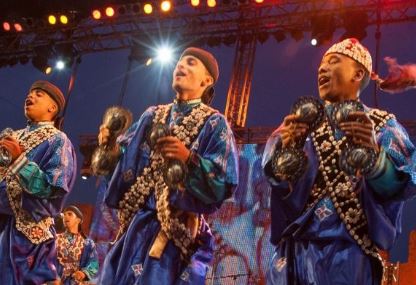
Here are some details for the various music festivals and events Morocco holds each year:
Taragalt Festival M’hamid Elghizlan
Sahara Music Festival 2020
www.festicket.com/festivals/sahara-music-festival/
Music festival in Essaouira:
www.essaouira.nu/calendar_festival_gnaoua.htm
Annual Festival of Sacred Music in Fez:
www.fesfestival.com
ORIGINS Festival 2020
www.festicket.com/festivals/origins-fest/i
Oasis Festival 2020
www.festicket.com/festivals/oasis-festival/
What about Food & Water?
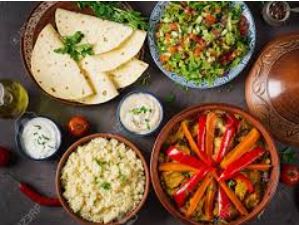
Moroccan cuisine is one that is flavoursome, nutritious and fresh. The staple ingredients include salads, vegetables, fresh and dried fruits, herbs, meat, fish, nuts and honey. Herbs and spices are used in every recipe which adds indulgence and aromatic experience not only for your taste buds but also for your eyes and nose. Traditional ways of cooking include the Tajine, which is meats and vegetables heavily seasoned and slow-cooked in a cone shapes clay pot for hours, which produces succulent meat that falls off the bone and deliciously buttery vegetables that have been cooked to perfection. Vegetarians and vegans are also catered for well with the wide variety of fresh fruit, veg and pulses.
It is advised never to drink tap water in Morocco, so be sure to stock up on 5l bottles of mineral water when you get there.
What’s the landscape like?
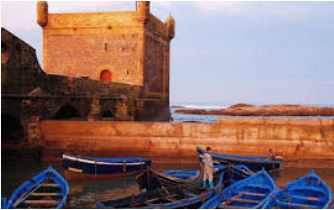
Morocco is a country full of contrast and extraordinary wonder, that spans across Mediterranean coastline in the north and the Atlantic Ocean, all the way through to the scenic mountain terrain and the serene wilderness of the Sahara.
Northern cities like Fez, Marrakech and Meknes are famous for the winding streets in the medina which you could almost lose yourself in, and a bustling souk in every area.
In contrast, the Atlas Mountains offer a glorious setting of tranquillity and serenity, hiking and trekking are modes often used to explore is a vast range. The south, bordering the Sahara is home to towns like Rissani and Mhamid, where camel trekking and camping out in the desert under the stars is a favourite activity amongst travellers. Some picturesque coastal towns to visit are, Essaouira and Tangier, which offer peace and wholesome simplicity as you explore its ancient walls.
How can I get around?

The most common modes of transport are trains, buses and taxis, although hiring a car is the best way to explore morocco as it allows you explore to true diversity the country has to offer in a shorter, more convenient and comfortable way.
Trains in Morocco run between the 7 major cities, Tangier, Meknes, Fez, Oujda, Rabat, Casablanca and Marrakech, they are safe and reliable, visit The Moroccan national train service website to find out more on schedules and fares: www.oncf.ma
Buses in Morocco run between major towns and cities. Long-distance buses are comfortable and air-conditioned, you can purchase tickets at the bus depot. For the bus schedules [please visit www.oncf.ma
Taxies are also an available mode of transport, although the fair will be higher fi you choose to ride alone as opposed to sharing with others, which might be a squeeze.
What is the political view/religion?
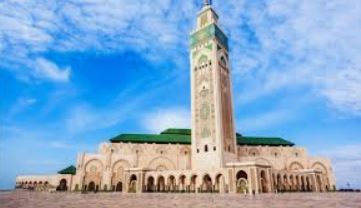
The kingdom of Morocco is one of the last countries in Africa with a constitutional monarchy. The current kind is King Mohamed VI. He is regarded as very Highley and respected greatly by all. He is seen as not only a political leader but also a religious leader. Known as a progressive ruler, he is actively encouraging the rapid growth of the Moroccan nation, commending globalisation and strengthening ties with the west.
Regardless, Morocco has upheld its tradition and history, which is very much alive in the hearts and infrastructure of the country
His father King Hassan II once famously said
“I wish Casablanca to be endowed with a large, fine building of which it can be proud until the end of time. I want to build this mosque on the water because God’s throne is on the water.”
What happens in Ramadan?
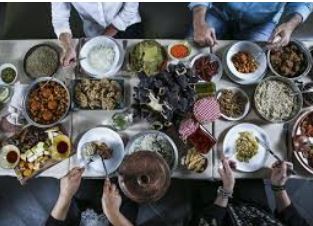
Ramadan is a religious ceremony in which Muslims fast from sunrise to sunset for one month. This month is regarded as a holy time, where common activities are forbidden during daylight hours, like drinking, eating and smoking. The long day of fasting is broken with family and friends around a platter of foods and dates, followed by communal praying into the night.
Many local cafes and restaurants will remain closed during the daylight hours, however, as a tourist, you will not be expected to fast and can attend the various café and restaurants that stay open for non-Muslims.
It is imperative that if you chose to travel to Morocco during Ramadan then you respect the locals. This is done by not eating, chewing gum, smoking or drinking in public. If you are at a café/restaurant or in your car then this is fine.
Many establishments close early in the evening to allow staff to return home to break their fast with food and drink, this means that certain establishments will be open later than usual to account for the time.
Islam is the official religion of Morocco, which will become evident when you hear the five calls the prayer that sound out over large speakers throughout the day. This call to prayer invites Muslims to attend the mosque to partake in prayer. It is not permissible for non- to enter mosques, however, the Hassan II Mosque in Casablanca is open to non-Muslims if they pay to join an escorted walking tour. Friday is considered a holy day, where prayer at the mouse is attended to in large numbers, and couscous is eaten throughout the country.
What are the Risks?
There are a few risks to bare in mind when visiting Morocco
Bathrooms and Hammams have tiled floors which may be slippery when wet.
Camel Riding, Follow the instructions given by your guide i.e. sit with your legs across the camel and hold on to the bar in front of you.
Crossing the road. Cars may be driving on the opposite side of the road than you are used to.
Fire. Please check the escape route in hotels when you check into your hotel or villa.
Heatstroke. Please ensure you always carry adequate supplies of water with you.
Henna. Henna is is a type of herb that is used to dye and condition the skin, with many benefits. However, some people may have adverse side effects to it so please do a test patch before you commit to a full design.
Petty crime. Always protect your valuables and money.
Swimming pools. Ensure your own safety when swimming and that of your children, as there is seldom lifeguard available.
Where/how to shop?

Haggling is considered a way of life in Morocco, as most items do not have a fixed price. Rest assured that it’s not just tourists that have to haggle, but part of the local’s everyday life. The key is to be respectful but to assert that the price stated is too expensive, or just plain ridiculous.
As the exchange goes on you will gain the respect of the shop owner who will most likely decrease the price. If this does not happen, don’t be dismayed, you will almost certainly find the item somewhere else in the souk, if not very similar. Be sure to calculate prices in your own currency so that you can be sure you’re paying what you think the item is worth.
The colourful and vibrant souk is a stable piece to Moroccan life, where you can find anything and everything from fresh produce, to furniture and even live animals. In the villages, it is predominantly men who attend whereas, in the towns and cities, it is men and women alike who brows that range of items and goods that the markets offer.
